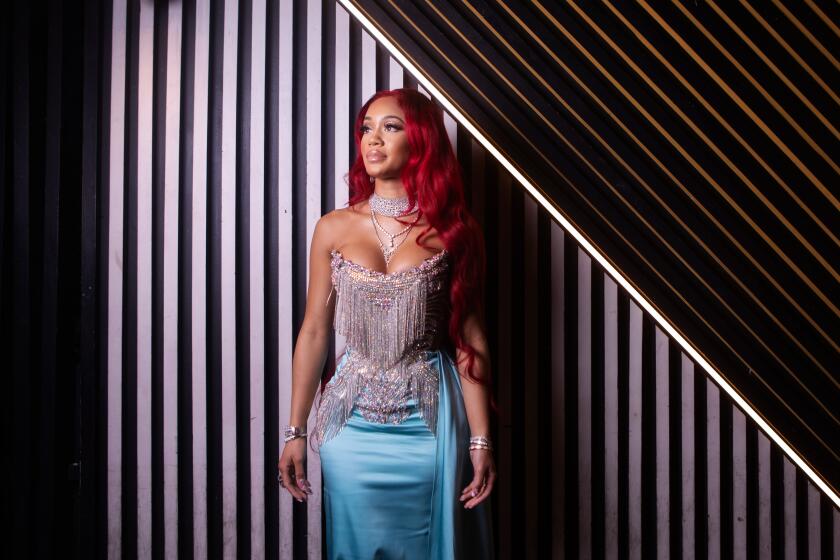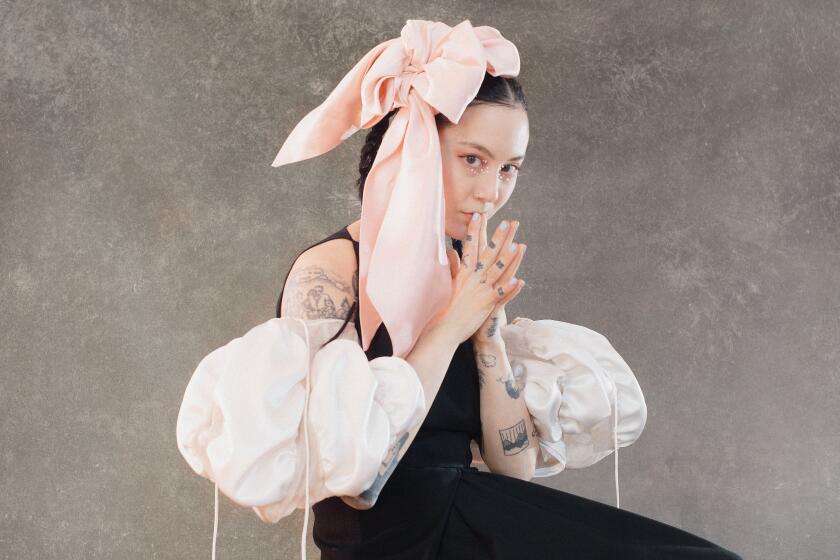- Share via
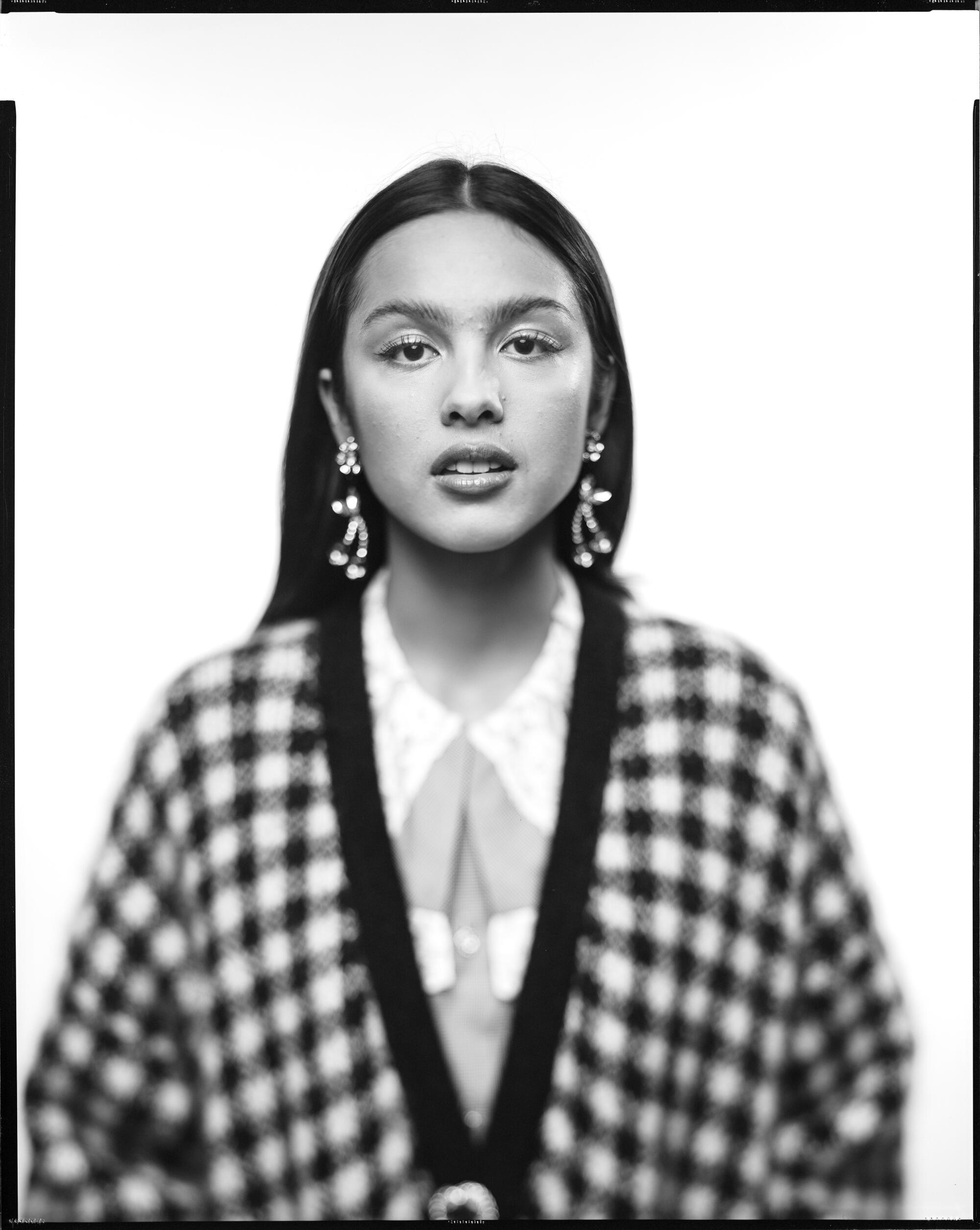
Olivia Rodrigo does not, as a general rule, read the comments.
“Sometimes you see one thing and then you’re thinking about it all day,” says the 18-year-old singer and songwriter responsible for 2021’s biggest debut album. “It’s the antithesis of good creativity.”
Late one night last May, though, she made an exception. Rodrigo’s smash LP, “Sour,” had just come out, and with it a lyric video on YouTube for the album’s empathy bomb of a closer, “Hope Ur OK.” Over layers of dreamy electric guitar, the song stitches together “stories that I’ve collected throughout my life,” Rodrigo says, “of people that I’ve known who’ve grown up in broken homes or have parents that didn’t accept them.”
With its focus on the trauma of others — a middle-school friend whose parents “hated who she loved,” a towhead blond who “wore long sleeves ’cause of his dad” — “Hope Ur OK” is in some ways an outlier on “Sour,” which otherwise takes a proudly autobiographical approach to the pleasures and torments of young love in songs such as Rodrigo’s pair of No. 1 hit singles, the gloriously melodramatic “Drivers License” and the gloriously caustic “Good 4 U.” But it also demonstrates this Disney Channel veteran’s desire to reflect something of her generation. So Rodrigo was curious to see how it had landed.
“I was literally just crying,” she recalls of her midnight scroll, which brought up the appreciative words of a girl forced to raise her younger siblings and of a trans kid “kicked out at 17,” as one commenter wrote. “Seeing people share their own experiences of things that were so devastating, and how this song gave them hope — I just didn’t expect anything like that to come out of my album.”
The fans she’d moved were just a fraction of the millions she’s made in the whirlwind 11 months since “Drivers License” dropped in early January and became an instant pop phenomenon. A slow-building power ballad about a young woman sobbing as she motors through the suburbs in the wake of a painful breakup, “Drivers License” seemed to channel an eternal ache even as it cleverly nodded to a bit of real-life gossip involving Rodrigo and fellow Disney performer Joshua Bassett.
The song topped Billboard’s Hot 100 for eight consecutive weeks and inspired a sketch on “Saturday Night Live”; eventually it helped propel “Sour” to a No. 1 bow of its own. Spotify reported that “Drivers License” was its most streamed song of 2021 and “Sour” its most streamed album; Apple Music stated that more of its users read the lyrics of “Drivers License” this year than read those of any other song — a distinction that might please Rodrigo even more than the rest.
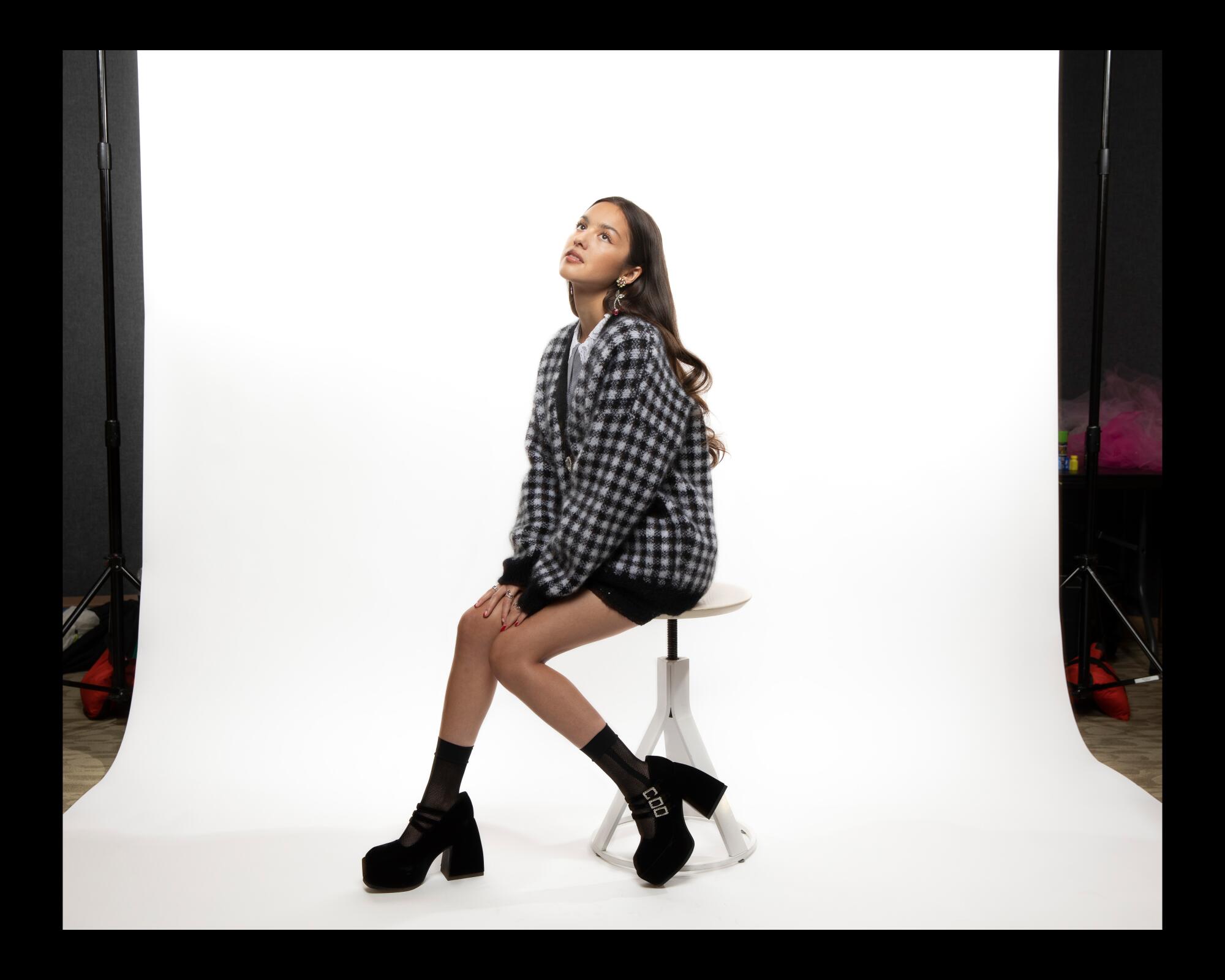
“I’ve only ever seen myself as a songwriter,” she says over lunch on L.A.’s Westside. “I remember the first time an article said, ‘Olivia Rodrigo is the next big pop star’ — I was like, There are so many things that go along with ‘pop star’ that I never thought I’d be.” She laughs. “But I’ll take it.”
Now she’s capping her breakout year with seven Grammy nominations, including nods in the four major categories of album of the year, record and song of the year (both for “Drivers License”) and best new artist. Rodrigo is the 13th person in Grammys history to score all four nominations in the same year, following the likes of Tracy Chapman, Mariah Carey, Amy Winehouse and an earlier Gen Z sensation, Billie Eilish, who actually went on to win the awards in 2020.
Count Rodrigo as a fan. “I’m obsessed with her new record,” she says of Eilish’s “Happier Than Ever,” which deals frankly with the psycho-emotional fallout of becoming a global celebrity in one’s teens — and which, as it happens, is among “Sour’s” competition for album of the year.
So far, Rodrigo says, her own rapid ascent has been largely positive. “Everyone’s like, ‘What a weird life, huh?’ But I don’t know, it’s probably not unlike the drastic change that another kid at 18 would have going to college.” That might be a stretch: In July, Rodrigo visited the White House to meet with President Biden and publicly encourage young people to get vaccinated. (One interesting outcome of her trip was finding out that certain unspecified people in her life had chosen not to get a shot. “Not everyone can think the way I do,” she says.)
The pop-star workload, she allows, is intense. When was her last day off? “Jesus, I don’t even know,” she says, before remembering that she and a friend spent a few nights at a resort in Santa Barbara in October. “But it’s almost all stuff I want to do. Even on my days off I love writing songs.”

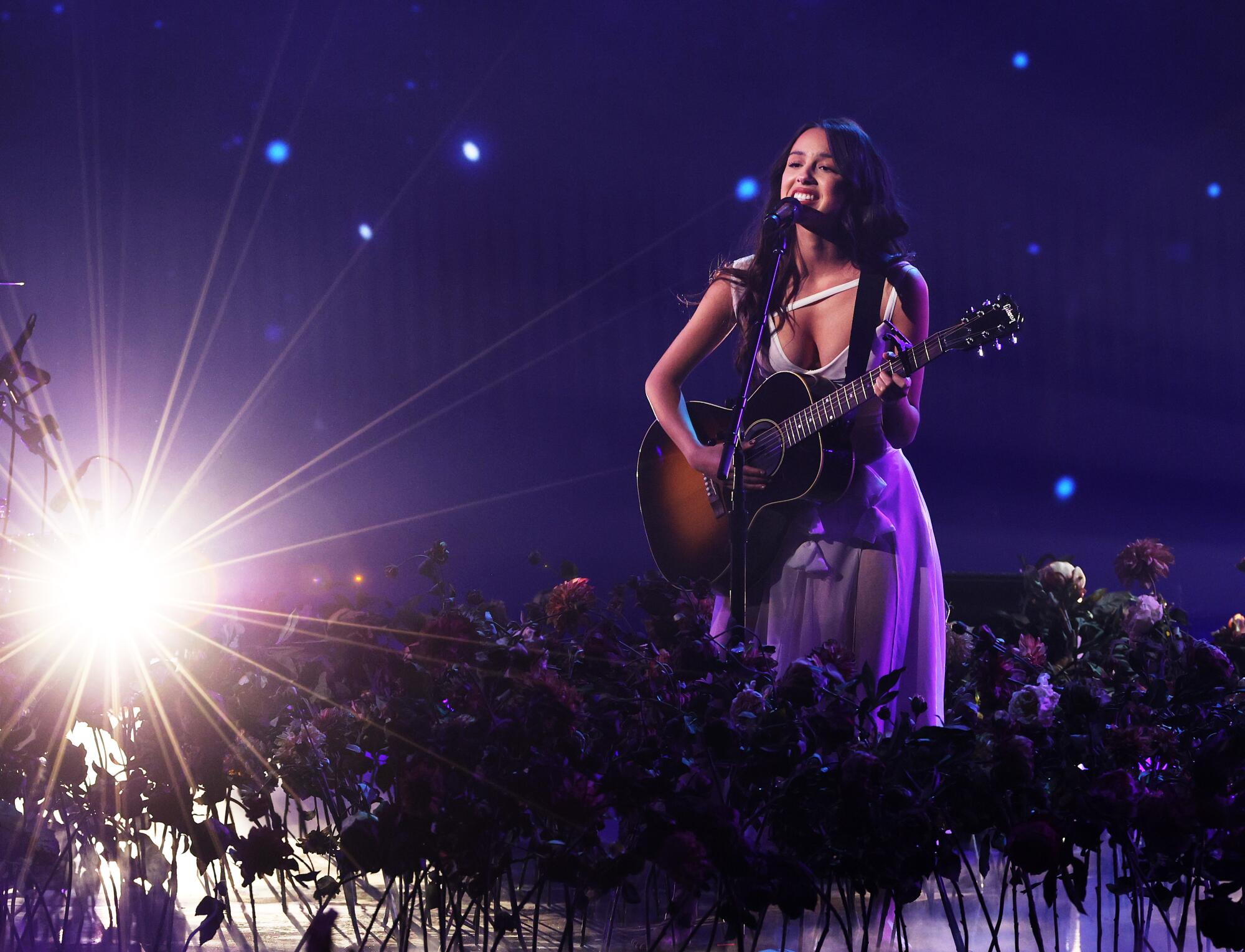
We’re sitting in a private dining room in an upscale Italian joint not far from Rodrigo’s apartment — the first she’s ever lived in on her own. Dressed in a powder-blue top and chunky boots, she orders ravioli and a sampling of meat skewers to share. Her mother’s a vegetarian, and Rodrigo grew up that way too. “Until one day when I was like, I just want chicken tenders so bad,” she says. “Ordered the tenders and never went back.”
Rodrigo’s iPhone sits on the table in front of her, but when it lights up with a text, she turns it over. Does the ease with which she could type out something right now and set her 19.6 million Instagram followers aflutter ever blow her mind?
“Completely,” she says. “I kind of can’t think about it — it’s paralyzing.” She says she always has someone on her team look over what she’s written before she posts; she also has a parental lock on her social media apps that limits her to 30 minutes a day. “I can’t override it, so once I’m done, I’m done.”
Saweetie is up for two Grammy Awards, including best new artist. Still, she says, “I feel like I’m constantly fighting for my value, and for respect.”
Rodrigo has a song called “Jealousy, Jealousy” explicitly about the moral hazards of a “toxic internet culture,” as she puts it, in which “people talk about women’s bodies in a way that’s completely unjust.” But even the most intimate material on “Sour” plays out against a kind of larger social backdrop; Rodrigo always seems in touch with the systems and institutions that have shaped her behaviors and appetites — the movies and websites and magazine covers that sell an often-unfulfilled fantasy of romance.
“She’s so self-aware,” says Daniel Nigro, who produced “Sour,” and indeed there’s an instinctive understanding to Rodrigo’s work that links her to other gifted Zoomers like Gracie Abrams and Holly Humberstone (and reveals the influence of slightly older songwriters like Taylor Swift and Phoebe Bridgers, whose live show Rodrigo recently caught at L.A.’s Greek Theatre).
“Gen Z in particular has such a bulls— barometer,” Rodrigo says. “We want to know what’s behind everything.” At the same time, she sees her and her friends’ fascination with the late ’90s and early 2000s — “My Pinterest is just old Winona Ryder and Gwyneth Paltrow pictures,” she says — as a subconscious longing for “a time when everything wasn’t so at the tip of your fingers and hyper-exposed.”
Bridgers returns Rodrigo’s admiration. “Olivia’s music is so exacting — it makes you feel something,” she says. In Bridgers’ view, the record industry usually “tries to defame musicians that teenage girls love, even though they forget that teenage girls invented the Beatles.” But the acclaim for Rodrigo has been encouraging: “It’s cool to see people finally be taken seriously at her age.”

Rodrigo, whose mom is white and dad is Filipino American, grew up in Temecula convinced she’d be an Olympic gymnast. “I was terrible at it — terrible!” she says now. “But I was like, ‘Mom and Dad, this is what we’re doing.’” An only child, she was always into music; her mom, an elementary school teacher, took her record shopping at Goodwill and Amoeba and taught her about grunge and riot grrrl: L7, Hole, Babes in Toyland. (“Brutal,” “Sour’s” cheerfully blistering opener, has some serious Bikini Kill energy.) Her first concert was a Weezer gig at the Del Mar Fairgrounds her parents dragged her to; later she begged them to take her to see Carrie Underwood.
“I was a big country girl when I was younger,” she says. One of her key Goodwill finds? A Tanya Tucker greatest-hits LP featuring “Delta Dawn,” which Tucker recorded when she was 13. “The song isn’t about her — she’s literally telling someone else’s story,” Rodrigo says of the early-’70s character study. “As a young kid, I was like, That’s so cool.”
Rodrigo started singing and writing songs before she hit double digits, and soon she was giving up gymnastics to belt adult-size ballads at little-kid talent shows. At 13 she was cast on the Disney Channel’s “Bizaardvark,” about a group of teenage internet content creators; among her co-stars was Jake Paul, the shock-merchant YouTuber turned pro boxing villain.
“I haven’t seen him since he left the show,” Rodrigo says of her old castmate. “But the last thing he said to me was, ‘You’re gonna sell out stadiums one day, kid.’”
Wait — Jake Paul, of all people, was the first to identify Rodrigo’s pop-star potential?
“He called it,” she says, laughing. “God, my publicist would not appreciate me saying this. He was very nice to me. I don’t really follow all the stuff he does online anymore.”

In 2019, Rodrigo booked the role of Nini on “High School Musical: The Musical: The Series,” a Disney+ extension of the durable Disney Channel franchise. Last year she wrote a song for the show, the plaintive “All I Want,” which went viral on TikTok and led to a deal with Geffen Records.
“I’ve been doing this for a minute, and usually what you hear from young writers are parts of songs,” says Sam Riback, co-head of A&R at Interscope Geffen A&M. “But with Olivia it’s the whole composition that’s so well put together.”
“I’m a big believer in the discipline of songwriting,” says Rodrigo, who swears by Elizabeth Gilbert’s book “Big Magic: Creative Living Beyond Fear.” “She talks about how ideas are more likely to come to you when you show up for them,” Rodrigo says, adding that she wrote a song every day for the first four months of COVID-19 quarantine. (She says the voice memos app on her phone is so full that it doesn’t work anymore.)
She and Nigro were equally diligent in the studio, cutting and re-cutting her vocals on every song until they were just right. One of Rodrigo’s strengths as a singer is her background as an actor; she knows how to bring a lyric fully to life, as in “Deja Vu,” where she punctuates a verse about an ex who recycles old jokes with a bitter little chuckle that says more than words could.
“Sometimes we’d do a take and it would be fine,” she says. “Then we’d do it again but Dan would film me while I was singing. I’d perform for the camera, and that take would be so much better.”
Already a bestselling author for her devastating memoir, “Crying in H Mart,” Japanese Breakfast’s Michelle Zauner is now also a two-time Grammy nominee.
When “Sour” came out, the song “1 Step Forward, 3 Steps Back” carried a co-writing credit for Swift and her producer, Jack Antonoff, because Rodrigo interpolated the piano chords from Swift’s song “New Year’s Day.” Then, months later, after fans on YouTube made videos about the similarities between “Good 4 U” and Paramore’s 2007 hit “Misery Business,” Rodrigo retroactively cut in that band’s Hayley Williams and Joshua Farro as co-writers on “Good 4 U” (with a combined 50% share of the song’s royalties, according to Billboard).
Asked if the experience bummed her out, Rodrigo sighs, then spends a few seconds deciding what she wants to say. “I think it’s disappointing in general to see people discredit young women’s abilities and talents,” she says. “All music is inspired by other music, and I think it would be so cool if a girl 15 years from now wants to write a song inspired by something I made. That’s the whole point of creativity.”
As her public profile has grown, Rodrigo says she’s stayed tight with a circle of old pals that includes “Bizaardvark’s” Madison Hu. (She’s reportedly dating Adam Faze, a podcaster and film producer.) Is she ever suspicious of the motives of would-be new friends? “You can always tell — there’s always a gut feeling,” she says. “But sometimes I can tell and I’m just like, I don’t care — I still want to hang out with them.”
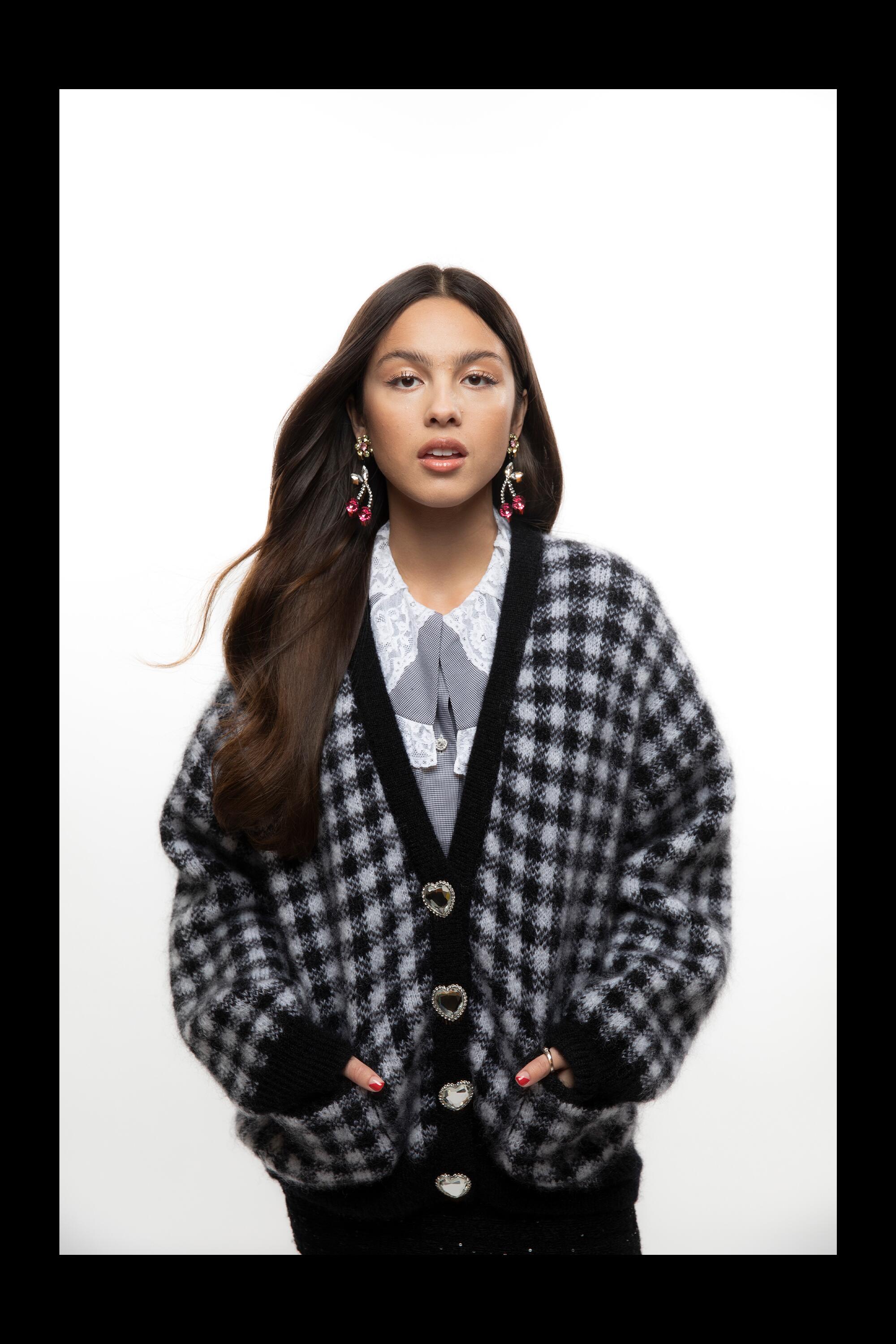
Looking ahead to 2022, Rodrigo is excited to finally mount her first tour behind “Sour,” which is scheduled to launch in April and play theaters, including the Greek in L.A. and New York’s Radio City Music Hall, rather than going straight into the arenas she likely could fill. “I don’t think I should skip any steps,” says Rodrigo, who will bring Abrams and Humberstone along as opening acts. At a recent rehearsal for a TV performance, she and her band — “It’s all girls,” she notes happily — ran through “Brutal,” which nearly brought a tear to her eye. “Six girls on electric guitars and things, rocking out on this super-crunchy grunge song — I feel like I didn’t get to see enough of that when I was a kid,” she says.
She’s started writing too, including one song the other day about the “way that young women are so competitive with each other and tear each other down in a way that’s so counterintuitive.” Many of the songs on “Sour” deal with first-time experiences and sensations, but she’s not worried about aging out of that perspective. “There’s always something on my mind I can talk about. I’ve been listening to a lot of rap lately, and I really admire rappers for that.” J. Cole’s latest, “The Off-Season,” is a current fave. “He can talk about anything and everything and we eat it up because he says it in such an interesting storytelling way.”
She and Nigro have fantasized about renting an Airbnb somewhere in Italy to hunker down and focus on her follow-up album. But first she’s committed to a third season of “High School Musical,” about which you have to assume she’s conflicted. (Asked if “Bizaardvark” was any good, she shakes her head, then claps her hand theatrically over her mouth, as though she’s uttered some forbidden truth.)
The Disney-to-Top 40 pipeline is typically a one-way affair, and though Rodrigo’s ride has been uncommonly quick, the thought of leaving music to return to a squeaky-clean kids show — well, actually, Rodrigo insists she doesn’t see it that way.
“I never take a break from music,” she says. “When I was shooting season 2 of [‘High School Musical’], I wrote like five of the songs on my album. So, honestly, I’m probably gonna be more productive.” She shrugs. “But who knows? I’ve only been doing this for a year. I’ve got a lot left to figure out.”
More to Read
From the Oscars to the Emmys.
Get the Envelope newsletter for exclusive awards season coverage, behind-the-scenes stories from the Envelope podcast and columnist Glenn Whipp’s must-read analysis.
You may occasionally receive promotional content from the Los Angeles Times.
